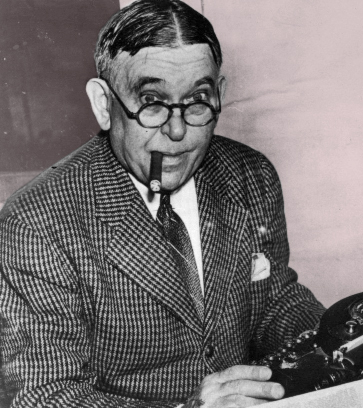
Journalist, essayist and “Sage of Baltimore” H.L. Mencken exchanged books frequently with medical historian Colonel Fielding H. Garrison. In the letter below, Mencken mentions his own book on Nietzsche, written at the age of twenty-five, which he had given to Fielding in the weeks before. Mencken goes on to discuss the necessity of tolerance, which he claims ought to extend to both the far left and the far right in the name of moderation.
Baltimore
August 8, 1919.
Dear Col. Garrison:
I got back from New York last night to find your letter, and now arrives a whole shelf of books! My very best thanks. They are all things that interest me, and most of them are things that I would have missed utterly. It will be a great pleasure to go through them. The Brahms book and the one on Moore will go back to you next week. I feel uneasy about raiding your library in this way, and shall pay you back horribly. Have you ever seen my Book of Burlesques? If not, then a rough evening is ahead of you. Or Europe after 8.15?
As for Nietzsche, I think his value lies in the fact that he is never quite sane, but always wildly extravagant. The truth always lies between: neither party is ever right. Well, the advocates of Christian ethics once had it all their own way. Even men who rejected Christian theology yet clung to Christian ethics. Nietzsche shook them out of this error. He stated the converse too violently; he was usually wrong in detail; his notions, as they stood, were unworkable; but he at least exerted a pull in the right direction; he at least busted the monopoly. His influence has been gigantic. I used to collect proofs of it, and had a large pile. Roosevelt borrowed “The Strenuous Life” from him. The whole anti-Bolshevist movement, in so far as it is intelligent at all, is based on his ideas.
My feeling about all such fellows is that they help to establish the truth by their very extravagance. On the one hand lies the great body of conventional doctrine – flabby, fly-blown and false. On the other hand lies the work of the revolutionists. The facts lie between. That is why I am so hotly in favor of free speech for Bolsheviks, birth controllers, Prohibitionists, anarchists, Mormons and other such fancy fellows. They may be idiotic, but they are surely no more idiotic than the average respectable Christian democrat. He is heard. Why shouldn’t they be heard? I believe that there is quite as much sense in Bolshevism as there is in the doctrine, say, of George W. Perkins, or Otto Kahn, or the Hon. Claude Kitchin.
Speaking of Kitchin reminds me that I went to the theatre again in New York the other night. The play was by Tom Dixon, the sensational ex-preacher, and it was presented with violent encomiums by Kitchin and Senator Overman, two of the damndest asses in Christendom. It turned out to be so imbecile that the audience yelled and even the actors on the stage snickered. Yet here were praises for it by Wilson’s chief spokesman in the House! Such spectacles make me long for the Japs. Let them come in, burn down the infernal country, and so end the farce.
I have tackled the Hauptmann book, and, at first blush, find it incomprehensible. My weak spot is physics. But I shall stick to it until I find out what he is saying. My belief about harmony is that it is all polyphony — that the secret of it is the suave movement of parts. That is, I think it is all horizontal. Every so-called rule of vertical harmony may be violated by parts that move “tune-fully”. The new harmony is wholly based upon that fact. But what does “tune-fully” mean? God knows!
You present an amazingly interesting picture of Billings. Another such Admirable Crichton was Gilman. At one time I saw him often. He was a thumping Pecksniff, but a man of the highest abilities. Dr. Fabian Franklin, editor of The (Profiteers’) Review, once wrote a bad biography of him – Tartuffe on Chadband. Baltimore has no monument to Gilman, but there are gaudy statues of men who founded fraternal orders. Like Billings he was a genius in general practice. When the Johns Hopkins Hospital was opened, he actually bought all the linen and bossed the painters. Billings’ eye is not Bismarckian, but Scandinavian. I know an old man in Christiana who has it to perfection. He spent his life as a bookkeeper.
From The New Mencken Letters. Edited by Carl Bode. New York: Dial, 1977. Print.
FURTHER READING
Read Theodore Roosevelt’s speech “The Strenuous Life,” mentioned above.
Read the full text of Moritz Hauptmann’s 1888 book, The Nature of Harmony and Meaning, referenced by Mencken above.
Explore the photograph albums of John Shaw Billings, the surgeon turned head of the New York Public Library whose biography Garrison wrote in 1915.


